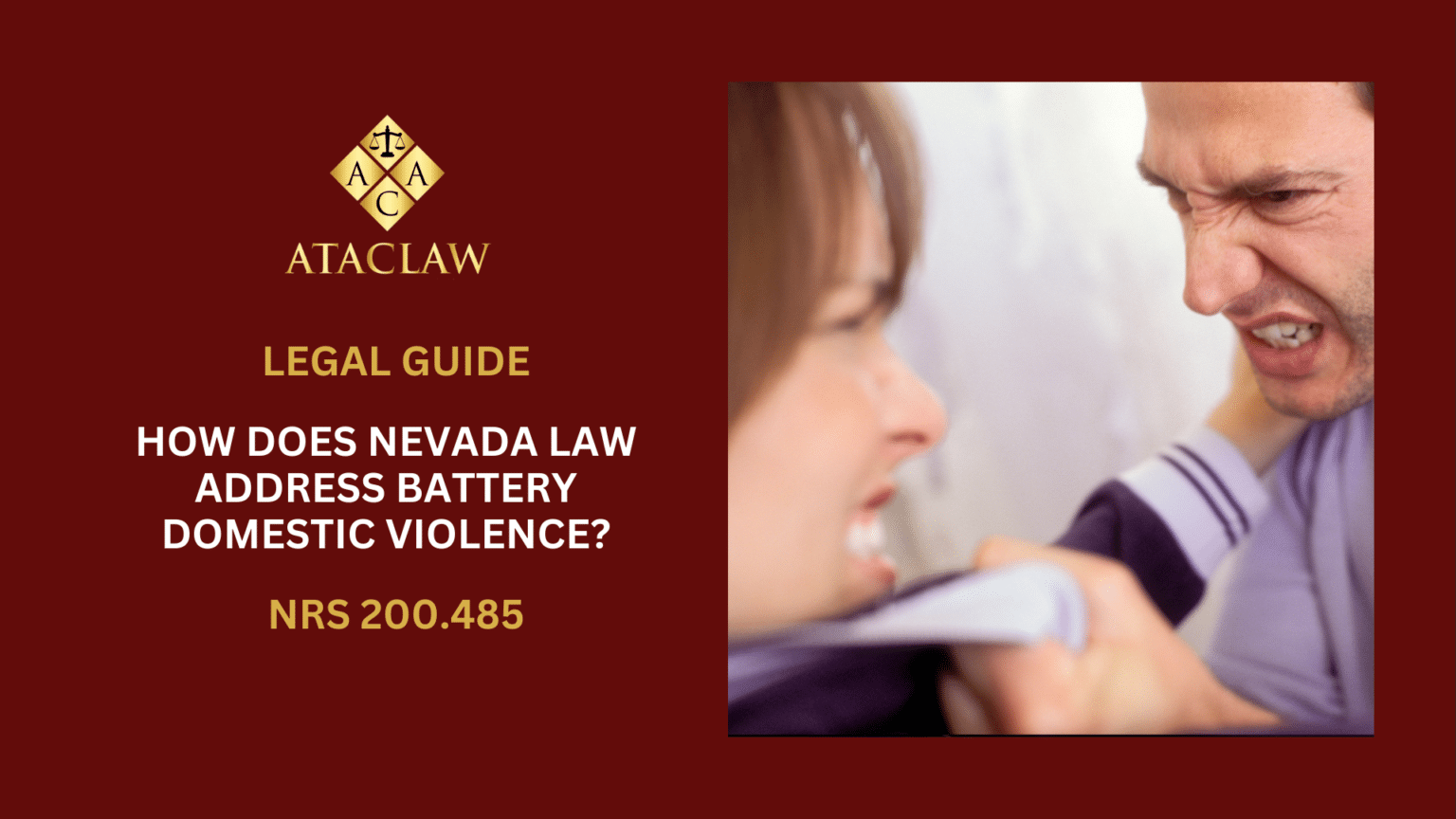In Nevada, Battery Domestic Violence (BDV) is a serious offense that encompasses the intentional infliction of unlawful physical force against current or former spouses, dating partners, or certain family members. The law is designed to protect individuals from physical harm within domestic settings, emphasizing the severity of such actions in the eyes of the law. Navigating the complexities of Nevada’s legal landscape, particularly in matters of Battery Domestic Violence (BDV), can be daunting. At ATAC LAW, we are committed to demystifying the laws for our clients and ensuring they are both well-informed and well-represented. This blog post aims to shed light on the key aspects of BDV as defined by NRS 200.485, the penalties involved, and critical information you should know.
What Constitutes Battery Domestic Violence Under Nevada Law?
In the legal landscape of Nevada, “battery domestic violence” (BDV) is characterized by a clear legal definition under the statute NRS 200.485, which encompasses two critical components:
- The existence of a domestic relationship between you and the alleged victim, past or present.
- The execution of battery on the alleged victim.
This legal perspective remains consistent whether the charges are pursued by a deputy district attorney in Justice Court or by a city attorney in Municipal Court.
For an act to be classified under BDV in Nevada, there must be a distinctive domestic, intimate, or familial link between you and the alleged victim. This encompasses:
- Spouses or domestic partners, irrespective of their current relationship status
- Individuals who co-parent a minor
- Significant others, with no mandate on the exclusiveness of the relationship
- Your minor children or those of the significant others listed above
- Relatives by blood or marriage, excluding cousins or siblings unless there exists a guardianship or custodial relationship
- Situations where you serve as the guardian of the alleged victim
In contrast, conflicts involving friends, neighbors, or strangers may fall under the category of battery as per NRS 200.481 but do not meet the criteria for a BDV charge.
In Nevada’s legal framework, the act of battery, as outlined in NRS 200.481, involves any deliberate form of unwanted physical contact that can be seen as violent, aggressive, or hostile. This may include behaviors such as:
- Striking
- Kicking
- Strangling
- Slashing
What Is the Cost of Bail for Domestic Violence Charges in Nevada?
In Nevada, how severe is the punishment for domestic violence offenses? The severity of penalties for domestic violence, legally referred to as Battery Domestic Violence (BDV), spans depending on the occurrence within a specific time frame and the nature of the incident. Here’s a breakdown:
For a first-time BDV within a seven-year period, recognized as a misdemeanor, one can expect:
- Fines ranging from $200 to $1,000, with a usual minimum of $300 after adding court costs.
- Community service ranging from 48 to 120 hours.
- A requirement to undergo domestic violence counseling for a minimum of 1.5 hours weekly for no less than six months.
- Possible jail time from 2 days to 6 months, which courts often suspend if other sentencing terms are met.
In the event of a second BDV offense within seven years, also a misdemeanor, the penalties escalate:
- Fines from $500 to $1,000, with at least $800 inclusive of court costs.
- 100 to 200 hours of community service.
- Continuous domestic violence counseling for at least 1.5 hours weekly over a 12-month span.
- A minimum jail sentence of 20 days extending up to 6 months.
A third BDV infraction within seven years advances to a category B felony, resulting in:
- Imprisonment from one to six years in the Nevada State Prison.
- Fines between $1,000 and $5,000.
Further offenses following a felony BDV conviction result in harsher repercussions:
- Incarceration for two to fifteen years.
- Financial penalties ranging from $2,000 to $5,000.
Notably, probation is not an option for felony BDV convictions.
Penalties for Aggravated Domestic Violence in Nevada
In Nevada, the penalties for Battery Domestic Violence (BDV) are significantly more severe when certain aggravating factors are present, such as the use of a deadly weapon or the infliction of substantial bodily harm on the victim. Substantial bodily harm includes injuries posing a serious risk of death, permanent disfigurement, or the prolonged impairment of any body part or organ, as well as injuries causing extended physical pain. Common examples of such harm include fractures, internal injuries, severe burns, significant facial injuries, and any injury requiring stitches.
BDV Resulting in Significant Harm Without a Deadly Weapon:
- Punishment ranges from 1 to 6 years of imprisonment
- Fines from $1,000 to $5,000
BDV Involving a Deadly Weapon Without Substantial Bodily Harm:
- Incarceration period spans 2 to 10 years
- Fines can reach up to $10,000
BDV With Both a Deadly Weapon and Substantial Bodily Harm:
- Prison sentences extend from 2 to 15 years
- A maximum fine of up to $10,000
Furthermore, BDV cases that entail strangulation, provided there was no serious bodily injury or deadly weapon involved, are classified as a Category C felony. The consequences for such offenses include 1 to 5 years in prison and fines up to $10,000, at the discretion of the judge.
Enhanced Penalties for BDV Involving Pregnant Victims and Consequences of Violating Restraining Orders in Nevada
In Nevada, the penalties for Battery Domestic Violence (BDV) increase substantially when the offender is aware that the victim is pregnant. Recognizing the added vulnerability of pregnant victims, the state imposes stricter consequences to deter such offenses.
First Offense: Classified as a gross misdemeanor.
- Up to 364 days in jail and/or
- Fines up to $2,000.
Subsequent Offenses: Treated as a Category B felony.
- Imprisonment ranging from 1 to 6 years.
- Fines between $1,000 and $5,000.
Restraining Orders Post-BDV Arrest:
Following a BDV arrest, Nevada commonly enforces restraining orders to protect victims. These orders typically mandate the offender to avoid contact with the victim and to surrender any firearms. Violating a restraining order is a punishable offense, with penalties increasing based on the number and types of prior offenses:
Temporary Protective Order (TPO) (up to 45 days):
- Violation Penalty: Considered a misdemeanor.
- Up to 6 months in jail and/or
- Up to $1,000 in fines.
- Extended Protective Order (up to one year):
- First Violation: Still a misdemeanor.
- Same penalties as TPO violation.
- Second Violation: Escalates to a gross misdemeanor.
- Up to 364 days in jail and/or
- Up to $2,000 in fines.
- Subsequent Violations: Classified as a Category D felony.
- 1 to 4 years in prison and
- Fines up to $5,000 (at the judge’s discretion).
In cases where a restraining order impacts familial relationships, such as child visitation, the accused may request a legal modification of the order. This must be done through a motion submitted by their attorney, which can potentially adjust the order’s terms to allow continued contact with children while ensuring the case is still pending.
Impact of BDV on Child Custody Cases in Nevada
In Nevada, child custody decisions are made with the paramount concern being the best interest of the child. However, these cases can be significantly affected by allegations of Battery Domestic Violence (BDV), an issue that complicates custody proceedings, especially when such allegations may be falsely made.
Joint Custody Presumption and its Overturn by BDV Allegations:
Nevada law starts with a baseline presumption favoring joint legal and physical custody of children between parents. This means that, in the absence of significant negative factors, both parents are assumed to have equal rights and responsibilities towards their children, including shared time and decision-making.
However, this presumption is immediately challenged if there’s “clear and convincing evidence” of BDV committed by one of the parents. When a judge finds such evidence, the law shifts to presume that awarding primary physical custody to the non-offending parent is in the child’s best interest. This creates a “rebuttable presumption” against the parent accused of BDV, suggesting they may not be fit for custody.
Overcoming the Rebuttable Presumption:
The legal system recognizes that false allegations can and do occur, sometimes motivated by a desire to gain an advantage in custody battles. Overcoming this presumption requires significant effort, as the accused must demonstrate their fitness for custody and challenge the credibility of the accuser’s claims.
Legal teams often employ strategies to expose false allegations, such as identifying “prior inconsistent statements” made by the accuser. By presenting evidence such as past text messages, emails, and voicemails, they aim to undermine the reliability of the accuser and demonstrate that the allegations of BDV are unfounded.
How Can You Get a Domestic Battery Charge Dismissed in Nevada?
Facing a domestic battery charge in Nevada can be daunting, with serious implications for your future. However, strategies exist to fight these charges, aiming for a reduction or complete dismissal, preserving your clean record.
- Claiming Self-Defense: Under Nevada law, you’re allowed to defend yourself against an imminent threat of harm, provided your belief in the necessity of action is reasonable, and the force used is only what’s necessary to avert the threat. Expert witnesses can play a crucial role in illustrating the distinction between defensive injuries and those caused by unjustified attacks, tipping the scales towards dismissal.
- Challenging the Credibility of Accusations: It’s not uncommon for BDV charges to stem from false accusations, especially during contentious situations like child custody disputes. Some accusers might even harm themselves to corroborate their claims. Expert analysis can differentiate between self-inflicted injuries and genuine ones, while other evidence such as eyewitness accounts and video surveillance can expose ulterior motives behind the accusations.
- Arguing the Incident Was Accidental: If the contact with the alleged victim was accidental and not intentional, this could form a solid defense. Demonstrating the lack of intent through video footage or witnesses can lead to charges being dropped.
- Exposing Police Misconduct: Any procedural errors or misconduct by the police during the investigation can undermine the case against you. If evidence was obtained unlawfully, challenging its admissibility could significantly weaken the prosecution’s position, potentially resulting in dismissal.
- Highlighting Insufficient Evidence: If your case proceeds to trial, questioning the adequacy of evidence to meet the stringent criteria of proving guilt beyond a reasonable doubt is a viable approach. Opting for a jury trial might work in your favor, as jurors often show more empathy towards defendants compared to judges, who might be influenced by suppressed evidence.
- Consideration of Battered Woman Syndrome: For women who have been in abusive relationships, your actions might be interpretable as preventive measures against further abuse. This nuanced defense requires a deep understanding of the syndrome and its impact on your actions.
Each BDV case presents unique challenges. However, armed with the right defense strategy and expert testimony, it’s possible to navigate these accusations successfully. If you’re facing such charges, seeking proficient legal representation is paramount to safeguard your future.
Is It Possible to Seal My Criminal Record in Nevada?
Absolutely. In Nevada, the opportunity to seal your criminal record depends on the level of the conviction. For misdemeanors or gross misdemeanors related to battery domestic violence, you can petition to seal the record seven years after the case’s conclusion. In cases where the conviction is a felony, the waiting period extends to 10 years post-case closure.
Should your battery domestic violence charges be reduced to a simple battery, the timeline becomes more favorable—you can apply to seal the record just two years after the case is closed. Moreover, if your charges are completely dismissed, you have the option to request an immediate sealing of your record. This option offers a fresh start, allowing you to move past the incident without a lingering criminal record.
Will a Domestic Battery Violence Case Appear on My Background Check in Nevada?
Yes, in Nevada, cases of battery domestic violence (BDV) will appear on criminal background checks until they have been officially sealed. It is advantageous to seek a record seal as soon as you are legally eligible. A clean criminal record can significantly enhance your opportunities for employment, obtaining professional licenses, securing loans, and finding housing. Taking prompt action to seal your record can be crucial for maintaining and improving your life prospects.
Can a Case Proceed If the Victim Doesn’t Want to Press Charges in Nevada?
In situations where the alleged victim of battery domestic violence (BDV) in Nevada chooses not to press charges or wishes to withdraw their allegations, it’s important to understand that this decision doesn’t automatically halt the legal proceedings. At the heart of this issue are two key reasons:
- Prosecution Decisions: In Nevada, criminal cases, including those involving BDV, are primarily disputes between the state and the defendant. It means the alleged victim’s preferences do not dictate the progression of charges.
- Prosecutor’s Perspectives: There’s a common belief among prosecutors that victims recanting their BDV claims could have hidden motives. For example, they might rely on the defendant for financial support or be under pressure from the defendant’s family to withdraw their accusations to avoid further conflicts.
Prosecuting BDV Without the Victim’s Cooperation
Without the direct cooperation of the victim, prosecutors must lean on alternative forms of evidence like eyewitness accounts or medical documentation of injuries. In cases where the victim is integral to the prosecution’s argument, they may summon even unwilling victims to the court to challenge their credibility. However, if the victim remains the sole piece of evidence and refuses to collaborate, prosecutors might be compelled to dismiss the case due to insufficient evidence.
Consequences for Victims Who Retract
Victims who retract their initial BDV accusations run the risk of facing legal repercussions themselves. This includes potential charges for filing a false police report. If victims ignore court summons, they also risk a contempt of court charge, potentially leading to an arrest warrant. However, it’s worth noting that enforcement of this varies and is at the judiciary’s discretion.
Is Hiring a Lawyer Essential for Your Domestic Violence Case in Nevada?
Engaging a proficient Nevada criminal defense attorney can significantly enhance your prospects of achieving a favorable outcome in a battery domestic violence (BDV) case, and here’s why:
- In-depth Case Investigation: Unlike public defenders who often have to spread their limited resources thinly across many cases, private attorneys have the bandwidth to conduct a comprehensive review of your case. This meticulous approach involves gathering all possible evidence that could undermine the prosecution’s argument, potentially tipping the scales in your favor.
- Persistence in Negotiation: Private law firms, driven by a commitment to their client’s best interests, invest the necessary time to negotiate aggressively with prosecutors. This tenacity can lead to case dismissals or more favorable plea agreements. In contrast, the overwhelming caseloads that public defenders manage may compel them toward quicker, less advantageous settlements for their clients.
- Advantageous Plea Deals: It’s observed that prosecutors are more inclined to offer appealing plea bargains to defendants represented by private counsel. The presence of an experienced lawyer signals that the case might meet sturdier defense, prompting more favorable terms to avoid a protracted court battle.
Given the severe implications of a BDV charge, including criminal sanctions and the potential impact on your employment and professional credentials, securing the expertise of dedicated domestic violence lawyers is a crucial step. Not only does it safeguard your legal rights, but it also maximizes your chances of navigating the complexities of the legal system successfully.
Will a Domestic Violence Conviction Affect My Gun Rights in Nevada?
Yes, a battery domestic violence (BDV) conviction in Nevada means you’ll lose your firearms ownership and possession rights, regardless of whether it’s a misdemeanor charge or if you’re in law enforcement or the military. The only path to regaining gun rights is through a pardon; record sealing won’t help. Additionally, possessing a firearm after a BDV conviction is a serious felony, leading to one to six years in prison and fines up to $5,000.
What Is the Statute of Limitations for Domestic Violence Offenses in Nevada?
Nevada law sets the statute of limitations for misdemeanor battery domestic violence charges at one year from the alleged incident. For felony battery domestic violence offenses, the legal timeframe for initiating charges extends to three years following the alleged crime.
What Are the Potential Outcomes of a Domestic Violence Charge in Nevada?
- Best-Case Outcome
In the most favorable outcome of facing a battery domestic violence charge in Nevada, the prosecution decides to dismiss the charges. Achieving this result typically requires a robust defense strategy, as Nevada law demands prosecutors to prove their inability to secure a conviction due to weak evidence before dropping such charges. - Worst-Case Outcome
The most severe consequence involves being found guilty and receiving the harshest sentence, including the maximum incarceration period. However, such extreme penalties are uncommon, particularly in misdemeanor cases. - Middle-Ground Outcomes
A range of scenarios exists between the best and worst cases:
-
- Some defendants may choose to plead “no contest” to the charges, accepting minimal penalties.
- It’s possible to negotiate a reduction of charges to less severe offenses, such as simple battery, disorderly conduct, or breach of the peace, all of which carry lighter consequences than a full battery domestic violence conviction.
- Judges might offer stayed adjudication, where a plea is entered but conviction is deferred pending the completion of certain conditions, potentially leading to a reduced charge or dismissal.
- Alternatively, a judge may allow a record submission without a plea, dismissing the charge upon completion of specified terms.
Effective negotiation by a criminal defense attorney is often key to reaching a favorable resolution in battery domestic violence cases, although it presents a challenging endeavor that demands thorough investigation and negotiation.
What Should You Do if Police Are on Their Way for a Domestic Violence call?
When faced with an impending police arrival after a domestic violence report, utilize the available moments to gather evidence to support your side. For instance, take photos of any injuries you may have sustained and collect contact details from witnesses who observed the incident.
Upon their arrival, police officers will scrutinize the situation for injuries on either party, although an arrest can occur even without visible wounds. Expect to be questioned separately, and during this process, it’s essential to avoid confessing or acknowledging guilt. While interacting with law enforcement, prioritize being courteous and cooperative.
Under Nevada law, if officers find probable cause to believe that an individual has committed battery domestic violence within the last 24 hours, they are obligated to make an arrest. If you find yourself under arrest, it’s critical to invoke your Miranda rights, electing to remain silent. Anything you disclose to the police can be leveraged by the prosecution in your case.
Be aware that post-arrest, jails in Nevada have a 12-hour “cooling-off” period before you can be released on bail. It is equally important to refrain from discussing your case with fellow inmates during this time. Conversations in jail can easily be overheard and shared with law enforcement or prosecutors, as inmates might seek to trade this information for their own legal benefits.
What Different Forms of Domestic Violence Are Recognized in Nevada?
In the state of Nevada, domestic violence encompasses a broad range of offenses beyond physical battery among individuals in a close relationship. Additional acts defined as domestic violence include:
- Assault, as outlined in NRS 200.471
- Coercion, according to NRS 207.190
- Sexual assault, under NRS 200.366
- Stalking, as detailed in NRS 200.575
- Arson
- Trespassing, following NRS 207.200
- Larceny (theft)
- Damage to private property
- Illegally carrying a concealed weapon, as prohibited in NRS 202.350
- Harm or fatality of an animal, in accordance with NRS 574.100
- Burglary, outlined in NRS 205.060
- Home invasion, as per NRS 205.067
- False imprisonment, detailed in NRS 200.460
- Pandering, as proscribed by NRS 201.300
These violations can serve as grounds for procuring a restraining order within the state, highlighting the legal system’s acknowledgment of the various forms domestic violence can take, from physical harm to psychological and emotional abuse.
For further legal assistance and to discuss your case with an expert, don’t hesitate to contact ATAC LAW.




